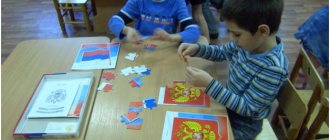MAGAZINE Preschooler.RF
Development of children's initiative and independence of preschool children in the context of the implementation of the Federal State Educational Standard.Mirontseva O.S. MADOU No. 41 “Swallow”
Independence – independence, freedom from external influences, coercion, and outside help.
Explanatory dictionary of the Russian language D.N. Ushakov
Independence is a generalized personality trait, manifested in initiative, criticality, adequate self-esteem and a sense of personal responsibility for one’s activities and behavior.
The Federal State Educational Standard states that one of the main principles of preschool education is to support children in various activities. Support for the initiative is also a condition necessary for creating a social situation for the development of children.
At the stage of completion of preschool education, the targets determined by the Federal State Educational Standard provide for the following age characteristics of children's capabilities:
- show initiative and independence in various activities;
- choose your occupation, participants in joint activities;
- demonstrate the ability to exercise volition;
- independently come up with explanations for natural phenomena and people’s actions;
- demonstrate the ability to make your own decisions.
The development of children's initiative and independence is carried out:
IN DIFFERENT PRACTICES:
- gaming;
- communicative,
- educational and research
- perception of fiction and folklore,
- productive,
- musical,
- motor,
- elementary labor;
IN DIFFERENT TYPES OF EDUCATIONAL ACTIVITIES:
- directly organized;
- in critical moments
- in independent; activities;
Federal State Educational Standards requirements for PPROS
They are aimed at developing the activity of children, with the help of which they become creators of their subject environment, and in the process of personal developmental interaction, creators of their personality.
- Conditions for organizing inclusive education;
- Taking into account national-cultural and climatic conditions;
- Content-rich, transformable, multifunctional, variable, accessible and safe.
Principles of the approach to organizing a subject-spatial developmental educational environment
- Principle of development and integration
- Activity principle
- The principle of stability and dynamism of the development environment
- The principle of integration and flexible zoning
- The principle of combining conventional and extraordinary elements in the aesthetic organization of the environment
- The principle of distance, position during interaction
- The principle of taking into account gender and age differences in children
- The principle of the emotionality of the environment, individual comfort and emotional well-being of the child and adult The principle of openness - closedness
Children's initiative and independence are manifested in the free activity of children according to their choice and interests. The opportunity to play, draw, design, compose, etc., in accordance with one’s own interests, is the most important source of the emotional well-being of a child in kindergarten.
In the form of independent initiative activities in kindergarten, all types of activities of the child can be carried out, since each activity has a unique impact on the development of different components of independence.
The concept of “creative initiative” . Creative initiative should be understood as the child’s involvement in a story-based game as the main activity of a preschooler.
Thank you for your attention
| Next > |


